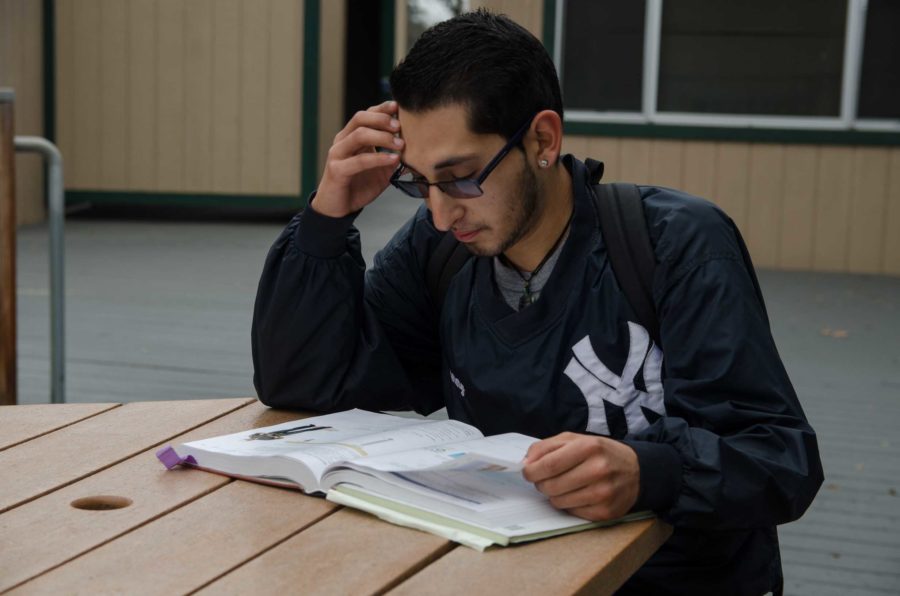Forty-six dollars a unit, $60 for a parking pass, $19 for health services; these are the regular semester costs of a Santa Rosa Junior College student. Then of course there are textbooks.
“Book prices are ridiculous,” said Jalen Soto, 18, SRJC criminal justice major. “As students, we pay too much.”
Soto expanded his qualms with bookstore prices. “We are college students, we are barely getting by,” he said. “Teachers who don’t put their textbook books on reserve are asking their students to fail.”
Generally costing hundreds of dollars a semester and virtually a universal requirement, textbooks are a principle cost for college students.
Students can choose where they buy textbooks. There is the traditional campus bookstore and the modernized online book markets.
Textbook prices rose 82 percent in the last 10 years, according to a report by the U.S. Public Interest Research Group surveying over 2,000 college students at more than 150 campuses across the country.
“The textbooks market is broken and students are paying the price,” said U.S. PIRG associate Ethan Senack in a U.S News article.
College Board estimates the average community college student expends more than $1,000 on textbooks annually.
SRJC’s Miguel Garcia, 19, a computer science major, avoids purchasing physical textbooks when he can. “First step, I try and torrent them,” he said (meaning he streams content online).
Garcia said while he likes the campus bookstore, it’s too overpriced for his patronage. “The textbook store really marks up the prices of books,” he said.
Antonella Andrade, SRJC bookstore Textbook Coordinator said the bookstore generally charges a 25 percent margin on its merchandise. Their prices are determined by what publishers charge them, Andrade said.
She said the bookstore is financially independent from SRJC and they are funded entirely by their own income. Excess profits are rendered to the school. The school also has access to the bookstore’s coffers. “This is a business, but we contribute to campus,” Andrade said.
When Garcia can’t find EBook versions of textbooks, he uses online mediums like Amazon, which usually have more inexpensive prices.
Akademos, an educational technology company, concluded in a 2013 study that on average 28 percent of college students use third-party online textbook providers over campus book stores.
According to the study, price was the deciding factor for most students who bypassed bookstores, with 78 percent citing cost.
Griselda Ochoa, 20, an SRJC student who buys her textbooks from the campus bookstores. “Prices should definitely be much lower, or the renting prices should be much lower,” Ochoa said.
Jesse Hayes, 20, a philosophy and religious studies student at SRJC, prefers online stores to the campus bookstore.
“I think they are very overpriced, I bought a textbook on Amazon for $10 that was $25 at the school,” he said.
Louis Henry, 18, SRJC humanities major, experienced the brunt of book price disparity.
Last semester Henry shouldered 12 units and paid around $500 for books using the campus bookstore. This semester he’s taking 20 units and paid under $300 using online bookstores, he said.
Henry pointed to economics as an explanation of high textbook prices. “We need textbooks to go to school, so they can charge us anything they want and we still buy it,” he said.
In terms of the bookstore staff’s views of textbooks prices, Andrande said, “We are just as disgusted as you are. It is highway robbery, but that is not necessarily the fault of the bookstore.”
SRJC Spanish major Joy Heffelfinger, 22, doesn’t consider campus bookstore prices abusive. “I think prices are fair. It’s a bookstore, they have to make some money right?” She said. “We pay for the convenience.”
Sam Salek, 21, an undeclared major concurred the bookstore’s convenience. “It is nice to have a place on campus to buy books,” she said.
Salek also said prices are too high for the average student.
Hunter Cornell, 32, an SRJC social behavior student outright prefers the bookstore to online options. “The prices are what they are,” he said.
“I like to get them in person, I guess I’m old school that way,” Cornell said.
Cornell utilizes the SRJC library reserve desk as well.
“My book needs are covered,” Cornell said.
U.S. PIRG reported 65 percent of college students forewent buying a textbook at one time because of its price, 94 percent of those worried the decision would affect their grades.
Hayes said some of his professors urge students to find used textbooks online and give students latitude on using older editions of textbooks, to save money.
Textbooks remain an integral resource in higher education, even as innovation makes Internet-based resources more relevant, as the prevalence of EBooks and similar programs demonstrate.






